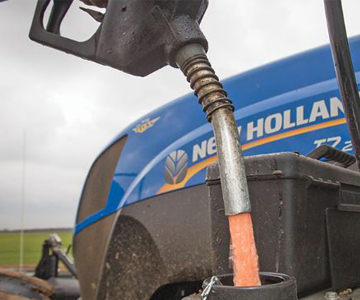Following recent changes to the UK’s Renewable Transport Fuel Obligation (RTFO) regulations, Gleaner Oils are looking to reiterate advice published by the FPS to business owners and farmers who use mobile machinery in regards to the potential use of FAME in Sulphur-Free Gas Oil (SFGO).
In order to meet new tougher biofuel targets under RTFO some fuel manufacturers may be adding FAME, a biodiesel additive to Gas Oil, which could cause issues for agricultural equipment including Tractors, Forklift Trucks and construction equipment.
Fuel manufacturers must ensure by January 2019, 8.5% of all UK fuels sold by suppliers must be made of biofuel in order to reduce CO2 emissions. FPS Technical Manager Tony Brown explained, “All suppliers are obligated to meet new targets but are free on just how they reach each target. There are different ways to achieve this, including the addition of FAME to SFGO, so we want to warn all users of NRMM (Non-road mobile machinery)”.
FAME is a biodiesel mostly made from recycled cooking oils and plant based material. As a biofuel it is likely to hold a higher water content than petroleum based fuels. Which could lead to fuel contamination and much more serious complications if left untreated. Luckily most modern mobile machinery engines are compatible with fuel containing the levels of FAME set out in the regulations. However it is important that business owners and farmers who use older machinery, are aware of what this could mean for them.
Complications from contaminated Gas Oil include:
- Many common rubbers, plastics and surface coatings will degrade from contact with fuels containing FAME
- Clogged filters due to a build-up of larger particles in the contaminated fuel
- Water contamination due to the higher water content of biofuel. If untreated this could lead to microbial contamination in the form of mould, bacteria and algae growth
- Fuel may degrade over time causing damage to expensive machinery
- Higher fuel consumption rate caused by a less powerful fuel
Here are our Top-Tips for preventing contamination of Gas Oil:
- Limit storage time of blended fuels to reduce air which can draw moisture from the biofuel
- Thoroughly check you tank before or immediately after a delivery. Consider getting a specialist tank clean before your delivery
- Regularly check for signs of contamination, including; cracks or erosion to the tank, water droplets, dirt or mould inside the tank, or a change in the distinctive Diesel smell. Remedial action should be taken if any of these signs are found.
- Regularly examine filters, pipework and seals. It is recommended that you replace filters every 2-3 deliveries.
- Purchase your fuel from a reputable oil supplier, to ensure you receive a high quality fuel and will have someone on hand should you have experience any complications.
